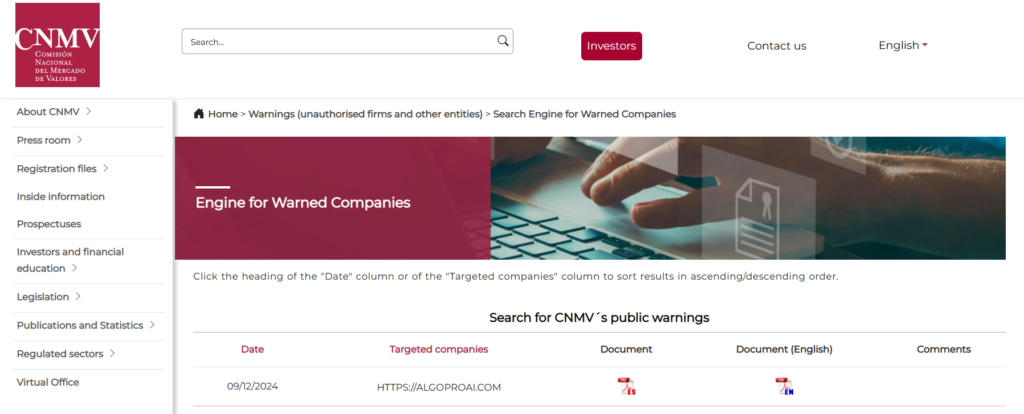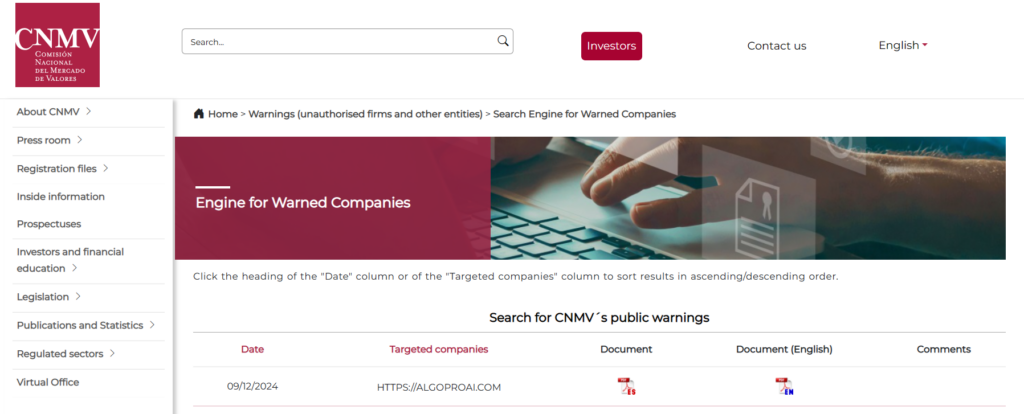The Comisión Nacional del Mercado de Valores (CNMV) has issued an official warning against AlgoProAI.com, highlighting it as an unregistered and unauthorized entity. Investors are advised to avoid engaging with this platform, which operates illegally in Spain and exposes users to significant financial risks.
Trace Your Lost Funds
Been scammed by an online company? We specialize in uncovering complex financial fraud and tracing lost assets. Don’t let scammers take away your hard-earned money. Take the first step toward justice—get a free consultation with CNC Intelligence by completing the form below.
Why Registration Matters
Firms offering financial services, such as trading, investment advice, brokerage, and collective investment schemes, must be authorized by the CNMV in Spain. Registration ensures compliance with strict regulatory standards, designed to protect investors from fraud and malpractice.
AlgoProAI.com has been flagged for operating without authorization. This lack of regulation means investors are left without safeguards, making them vulnerable to potential fraud or significant financial losses.
Key Concerns Raised by the CNMV
The CNMV has identified the following concerns about AlgoProAI.com:
- Unauthorized Financial Services: Offering trading and investment services without the required registration.
- Deceptive Claims: Misrepresenting legitimacy to attract clients.
- High Risk to Investors: Operating outside the regulatory framework, leaving users unprotected.
Warning Signs of Fraudulent Entities
If approached by AlgoProAI.com or similar platforms, watch for these red flags:
- Unverified Registration: Always check the CNMV’s official registry to confirm a firm’s authorization status.
- Unsolicited Contact: Fraudulent companies often use unsolicited calls, emails, or ads to lure investors.
- Promises of Guaranteed Returns: Be cautious of unrealistic claims of high returns with little or no risk.
- Urgency Tactics: Scammers may pressure you to invest quickly, bypassing due diligence.
Steps to Protect Yourself
- Verify Authorization: Use the CNMV’s official resources to confirm if a firm is licensed to operate.
- Avoid Sharing Sensitive Information: Do not provide personal or financial data to unverified entities.
- Consult Financial Experts: Use our portal to get trusted advice and verify investment opportunities before committing.
What to Do If You’ve Been Targeted
If you suspect fraudulent activity involving AlgoProAI.com or believe you’ve been approached by an unauthorized firm:
- Stop Communication Immediately: Disengage with the platform.
- Report to the CNMV: File a complaint via the CNMV’s website to help prevent further scams.
- Seek Professional Help: Contact our portal for guidance on recovering lost funds and protecting your financial assets.
Why Expert Guidance is Important
Unauthorized platforms like AlgoProAI.com often use sophisticated methods to deceive investors. Professional advice can help you:
- Verify the legitimacy of financial service providers.
- Understand your rights and recovery options.
- Take proactive steps to safeguard your investments.
Final Thoughts on AlgoProAI.com
The CNMV’s warning against AlgoProAI.com underscores the importance of vigilance when engaging with financial platforms. Always verify credentials and consult experts before making investment decisions.

Tips on Fighting Back Against Disinformation
Disinformation—false or misleading information intentionally spread to deceive—can have serious consequences, from sowing societal discord to enabling financial scams. Fighting back requires vigilance, critical thinking, and proactive measures. Here are practical tips to help combat disinformation effectively.
1. Verify Before Sharing
Why It Matters:
Sharing false information amplifies its reach and credibility. Verifying content before sharing is the first line of defense against disinformation.
How to Verify:
- Check the Source: Reliable information typically comes from reputable and recognized organizations. Be wary of anonymous or questionable sources.
- Look for Corroboration: Cross-check the information with other credible sources to ensure consistency.
- Use Fact-Checking Websites: Platforms like Snopes, PolitiFact, and FactCheck.org specialize in debunking disinformation.
2. Understand Common Tactics
Why It Matters:
Recognizing disinformation tactics can help you spot red flags and avoid being misled.
Common Tactics Include:
- Clickbait Headlines: Overly sensational or emotionally charged titles.
- Deepfake Media: Manipulated videos or images designed to deceive.
- Fake Accounts: Bots or fake profiles spreading false narratives.
3. Evaluate Emotional Triggers
Why It Matters:
Disinformation often plays on emotions like fear, anger, or excitement to encourage impulsive reactions.
What to Do:
- Pause and reflect before reacting to emotionally charged content.
- Ask, “Is this designed to provoke a specific reaction?”
4. Report Disinformation
Why It Matters:
Reporting false content helps reduce its spread and holds perpetrators accountable.
Where to Report:
- Social media platforms like Facebook, Twitter, and Instagram have reporting tools for flagging false or harmful content.
- Local authorities or regulatory bodies for scams or fraudulent activity.
5. Educate Yourself and Others
Why It Matters:
Education empowers individuals to recognize and resist disinformation.
How to Educate:
- Stay informed about common scams and fake news trends.
- Share your knowledge with friends, family, and your community to build collective awareness.
6. Strengthen Digital Literacy
Why It Matters:
Digital literacy equips you with the skills to critically assess online content.
Key Skills to Develop:
- Spotting Fake News: Learn to differentiate between authentic journalism and propaganda.
- Understanding Algorithms: Know how platforms amplify certain types of content.
- Fact-Checking Techniques: Familiarize yourself with tools and methods to verify information.
7. Use Secure Tools and Settings
Why It Matters:
Scammers often exploit technological vulnerabilities to spread disinformation and target individuals.
How to Stay Secure:
- Use up-to-date antivirus software and firewalls.
- Enable two-factor authentication (2FA) on all accounts.
- Be cautious of unsolicited emails, links, or attachments.
8. Promote Credible Sources
Why It Matters:
Amplifying credible sources reduces the influence of false information.
What to Share:
- Links to reputable news outlets or fact-checked articles.
- Official updates from trusted organizations or government bodies.
9. Advocate for Transparency
Why It Matters:
Encouraging transparency in media and technology helps reduce the prevalence of disinformation.
How to Advocate:
- Support policies or platforms that prioritize content moderation and fact-checking.
- Demand accountability from social media platforms and tech companies.
10. Stay Skeptical
Why It Matters:
Maintaining a healthy skepticism helps you approach information critically rather than blindly trusting it.
Questions to Ask:
- Who created this content, and why?
- Is the information backed by evidence or data?
- Could this be satire or parody?
FAQs: How Scams Like AlgoProAI.com Use Disinformation
1. What is disinformation in the context of scams?
Disinformation refers to false or misleading information intentionally spread by scammers to deceive, manipulate, or exploit individuals. It can take many forms, such as fake news, manipulated media, or fraudulent claims, all designed to mislead victims and achieve the scammer’s goals.
2. How do scammers use disinformation to target victims?
Scammers use disinformation to:
- Create fear, urgency, or excitement to prompt impulsive actions.
- Fabricate convincing narratives, like pretending to represent trusted organizations.
- Manipulate emotions, such as sympathy or greed, to influence decision-making.
- Spread fake reviews or endorsements to build false credibility.
3. What platforms do scammers use to spread disinformation?
Scammers exploit a variety of platforms, including:
- Social Media: Fake posts, ads, or viral hoaxes.
- Email and Messaging Apps: Phishing emails or smishing (SMS phishing).
- Websites: Counterfeit domains mimicking legitimate organizations.
- News Outlets: Fake press releases or articles on less-regulated news websites.
- Forums and Communities: False information spread in online discussion boards or groups.
4. What are some examples of disinformation scams?
Examples include:
- Investment Scams: Fake opportunities promising high returns, supported by fabricated success stories.
- Health Scams: False cures or treatments for diseases, often during crises like pandemics.
- Tech Support Scams: Alerts claiming viruses or issues with your device, urging immediate action.
- Charity Scams: Fake charities using emotional stories to solicit donations.
- Romance Scams: Fake profiles sharing disinformation to gain trust and request money.
5. How do scammers make their disinformation believable?
Scammers use tactics like:
- Mimicking Trusted Brands: Copying logos, designs, or language from reputable organizations.
- Social Proof: Posting fake reviews, testimonials, or endorsements.
- Emotional Manipulation: Using urgent or fear-inducing language.
- Deepfakes and Edited Media: Creating convincing fake videos or images.
- Partial Truths: Incorporating bits of real information to add credibility.
6. Why is disinformation effective in scams?
Disinformation works because it:
- Exploits cognitive biases, like trust in authority or herd mentality.
- Spreads quickly, especially on social media, reaching large audiences before it’s debunked.
- Preys on emotions, overriding rational thinking.
- Uses technology like AI to craft realistic but false content.
7. How can I spot disinformation used in scams?
To identify disinformation:
- Verify Sources: Check the legitimacy of the sender or website.
- Look for Red Flags: Poor grammar, overly emotional language, or unverified claims.
- Check URLs: Ensure links lead to secure, official websites.
- Use Fact-Checking Tools: Platforms like Snopes or FactCheck.org can confirm the validity of claims.
- Be Skeptical of Urgency: Scammers often pressure you to act quickly without thinking.
8. What should I do if I suspect disinformation in a scam?
If you encounter potential disinformation:
- Stop and Think: Don’t act immediately on emotionally charged or urgent messages.
- Report It: Alert relevant authorities, such as regulatory bodies or the platform where the scam appeared.
- Warn Others: Share information with your network to prevent others from falling victim.
- Seek Expert Help: Contact professionals to guide you in verifying claims or recovering lost funds.
9. Can disinformation from scams be harmful even if I don’t act on it?
Yes, disinformation can harm society by:
- Undermining trust in legitimate institutions.
- Spreading confusion and fear.
- Influencing decision-making based on false premises.
- Damaging reputations of legitimate organizations or individuals.
10. How can I protect myself from scams using disinformation?
Protect yourself by:
- Staying informed about common scam tactics.
- Regularly updating your devices and using security tools.
- Avoiding unsolicited communications and links.
- Verifying all financial or personal requests with trusted sources.
- Educating others about the risks of disinformation in scams.
By understanding how scammers leverage disinformation, you can better safeguard yourself and your community from falling victim to these deceptive schemes.





